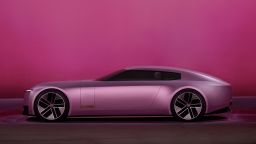Jaguar Faces Turbulent Times Amid Leadership Changes and Sales Decline

Jaguar Land Rover is grappling with significant challenges following a year marked by leadership changes and a dramatic plunge in sales. The luxury automaker, which has been a prominent name in the industry for over a century, launched a new brand identity nearly twelve months ago. Unfortunately, this initiative has not delivered the anticipated results, and the company now faces mounting scrutiny.
In a notable turn of events, former President Donald Trump criticized Jaguar’s recent advertising campaign, labeling it “stupid” and “seriously WOKE.” His remarks came in response to a commercial that featured abstract slogans like “live vivid” and showcased gender-fluid models without displaying the vehicles themselves. Trump expressed his disbelief at the ad’s approach, stating, “Who wants to buy a Jaguar after looking at that disgraceful ad?” He also claimed that the company had lost “BILLIONS OF DOLLARS SO FOOLISHLY.”
Despite Trump’s comments, it is important to clarify that Jaguar Land Rover has been owned by Tata Motors since 2008, meaning the brand does not have a traditional market cap. Tata Motors itself remains robust, with a valuation of approximately $28 billion.
Jaguar’s current predicament runs deeper than advertising woes. Earlier this year, the automaker announced it would halt all car production in 2024 as it transitions entirely to electric vehicles. This shift has led to headlines reporting a staggering 97.5% decline in sales across Europe in April, according to data from the European Automobile Manufacturers’ Association. This steep drop is closely tied to the cessation of car manufacturing, but it has nonetheless fueled negative perceptions, particularly among certain political figures.
Following the controversial ad release, Jaguar showcased its Type 00 concept car at the Miami Art Week, a venue not typically associated with traditional automotive exhibitions. While this concept is not slated for production, it is intended to signal Jaguar’s future design direction. The company has not disclosed when it plans to resume manufacturing.
In recent developments, Adrian Mardell, the CEO of Jaguar Land Rover, announced his resignation after a lengthy tenure exceeding three decades. Mardell played a crucial role in transforming the company, eliminating billions in debt and steering Jaguar Land Rover to report nine consecutive profitable quarters as of January, largely driven by strong sales of SUVs.
On Monday, Tata Motors appointed P.B. Balaji, the current Chief Financial Officer, as the new CEO of Jaguar Land Rover, effective November. This leadership change comes at a pivotal moment for the automaker, as it seeks to navigate the complexities of the evolving automotive landscape while addressing both operational challenges and public perception.
The future remains uncertain for Jaguar as it attempts to redefine its brand and product offerings in an increasingly competitive market. The shift to electric vehicles represents a critical juncture, and the company will need to effectively communicate its strategy to regain consumer confidence.






